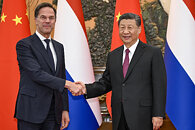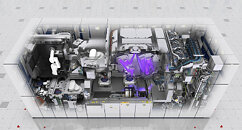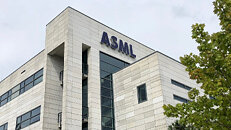T0@st
News Editor
- Joined
- Mar 7, 2023
- Messages
- 2,177 (3.18/day)
- Location
- South East, UK
Earlier today, Dutch Prime Minister Mark Rutte met with China's President Xi Jinping—fresh reportage has focused on their discussion of technological trade restrictions. Holland's premier had to carefully navigate the conversation around recent global tensions, most notably the prevention of fancy ASML chipmaking equipment reaching the Chinese mainland. CCTV (China's state broadcaster) selected a couple of choice quotes for inclusion in an online report—Xi remarked that: "the Chinese people also have the right to legitimate development, and no force can stop the pace of China's scientific and technological development and progress." Specific manufacturers and types of machinery were not mentioned during the meeting between state leaders, but media interpretations point to recent ASML debacles being entirely relevant, given the context of international relationships.
ASML is keen to keep Chinese firms on its order books—according to AP News: "China became ASML's second-largest market, accounting for 29% of its revenue as firms bought up equipment before the licensing requirement took effect." Revised licensing agreements have stymied the supply of ASML most advanced chipmaking tools—Chinese foundries have resorted to upgrading existing/older equipment (backed by government funding) in efforts to stay competitive with international producers. Semiconductor Manufacturing International Corporation (SMIC) is reportedly racing to get natively designed EUV machines patented (in co-operation with Huawei). Post-meeting, Rutte commented (to press) on the ongoing technology restrictions: "what I can tell you is that... when we have to take measures, that they are never aimed at one country specifically, that we always try to make sure that the impact is limited, is not impacting the supply chain, and therefore is not impacting the overall economic relationship."



View at TechPowerUp Main Site | Source
ASML is keen to keep Chinese firms on its order books—according to AP News: "China became ASML's second-largest market, accounting for 29% of its revenue as firms bought up equipment before the licensing requirement took effect." Revised licensing agreements have stymied the supply of ASML most advanced chipmaking tools—Chinese foundries have resorted to upgrading existing/older equipment (backed by government funding) in efforts to stay competitive with international producers. Semiconductor Manufacturing International Corporation (SMIC) is reportedly racing to get natively designed EUV machines patented (in co-operation with Huawei). Post-meeting, Rutte commented (to press) on the ongoing technology restrictions: "what I can tell you is that... when we have to take measures, that they are never aimed at one country specifically, that we always try to make sure that the impact is limited, is not impacting the supply chain, and therefore is not impacting the overall economic relationship."



View at TechPowerUp Main Site | Source





